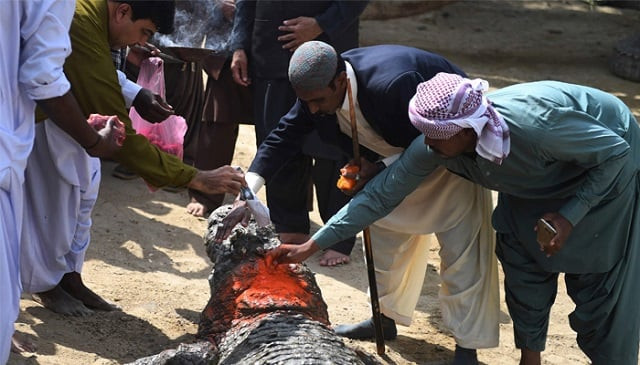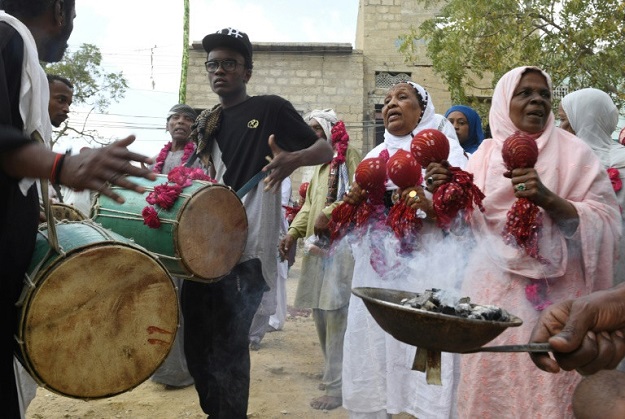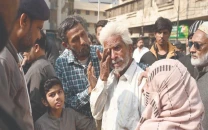Crocodiles guard secrets of Pakistan's lost African past
Sheedi mela at Mangho Pir’s shrine allows participants to connect with their African roots

The oldest crocodile -- believed to be anywhere between 70 and 100 years old -- is feted at the festival's climax. PHOTO: AFP
For many Sheedis, the swampy crocodile shrine of Sufi saint Haji Syed Shaikh Sultan - more popularly known as Mangho Pir - is the most potent symbol of their shared African past, as they struggle to uncover the trail that led their ancestors to Pakistan.
Many, like 75-year-old Mohammad Akbar, have simply given up the search for their family's origins.
One of Karachi's oldest festivals, Sheedi Mela comes to a close
The descendants of Africans who have been arriving on the shores of the Subcontinent for centuries, the Sheedis rose to lofty positions as generals and leaders during the Mughal Empire. But, actively discriminated against during British rule, their traditions began to fade and they found themselves wholly shunned when Pakistan was created in 1947, absent from the country's elite political and military circles.
Figures are scant but it is generally accepted that Pakistan holds the highest number of Sheedis in the Subcontinent - upwards of around 50,000 people.
 The Sheedi mela, or festival, at the Mangho Pir shrine has been the epicentre of the community in Sindh for centuries. PHOTO: AFP
The Sheedi mela, or festival, at the Mangho Pir shrine has been the epicentre of the community in Sindh for centuries. PHOTO: AFPBut their history has been scantily written, making it difficult if not impossible for Sheedis, including even those like Akbar whose ancestors arrived in Pakistan relatively recently, to trace their antecedents.
"I came to know in the 1960s that my grandfather belonged to Zanzibar. We contacted the Tanzanian embassy to find our extended family," Akbar explained. "We were told that we would never be able to reach them until we can identify our tribe, which we don't know," he said. "I never tried again."
His plight is common, with little in the way of documentation or scholarship on the community.
 Their history has been scantily written, making it difficult for Sheedis to trace their antecedents. PHOTO: AFP
Their history has been scantily written, making it difficult for Sheedis to trace their antecedents. PHOTO: AFPWhat is available suggests that many arrived as part of the African slave trade to the East - a notion rejected by many Sheedis, most of whom now reside in Sindh.
"We don't subscribe to the theories that someone brought us as slaves to this region because Sheedis as a nation have never been slaves," argued Yaqoob Qanbarani, chairperson of the Pakistan Sheedi Ittehad, a community group.
Others say the community's origins can be traced back to the advent of Islam, claiming a shared lineage with Hazrat Bilal - one of Prophet Mohammad's (pbuh) companions.
As knowledge of their origins has faded, so too have many of their traditions including the vestiges of Swahili once spoken in parts of Karachi.
 The shrine is also home to over 100 lumbering crocodiles who have lived there for generations. PHOTO: AFP
The shrine is also home to over 100 lumbering crocodiles who have lived there for generations. PHOTO: AFP"Swahili has been an abandoned language for some generations now," said Ghulam Akbar Sheedi, a 75-year-old community leader. "I remember that my grandmother would extensively use Swahili phrases in our daily conversation," said 50-year-old Atta Mohammad, who now struggles to remember even a few sayings.
With so many traditions lost to the past, the Sheedi mela, or festival, at the Mangho Pir shrine has assumed rich significance and been the epicentre of the community in Sindh for centuries.
They no longer know why it is held there, they are simply following in the steps and repeating the words of their ancestors.
"It attracts the Sheedi community from all over Pakistan," Qanbarani explained. "We celebrate the Mangho Pir mela more than Eid," he added.
The celebration features a dancing procession or dhamal, with men and women in trance-like states.
"The dhamal... is done with great devotion and much delicacy," said Atta Mohammad. "Some of us are captured by holy spirits."
Mehrun Nissa, 65, prepared a sacred drink during the mela while translating from what she says is a Swahili dialect.
"‘Nagajio O Nagajio, Yo aa Yo’.... means now we are leaving to have a drink from the bowl," she explained. Mangho Pir is also home to over 100 lumbering crocodiles that waddle between the devotees near a swampy green pond where they have lived for generations.
According to legend, lice on the Sufi saint's head transformed into the reptiles who now live at the shrine in Manghopir.
The oldest crocodile - known as Morr Sahab - is believed to be anywhere between 70 and 100 years old and is feted at the festival's climax with garlands and decorative powder while being fed chunks of raw meat.
 PHOTO: AFP
PHOTO: AFPEven this tenuous link to the community's past is in danger of being severed, however.
"The situation was not suitable for us as children and women also participate in the mela," said Qanbarani, as heavily armed police commandos flanked the crowd. He was speaking about the festival’s earlier hiatus.
But with dramatic improvements in security in recent years the community hopes to continue the mela, celebrating traditions that have survived slavery, colonisation, and modernisation.
Isolation colours the lives of the lepers of Manghopir
"It is a Sheedi community belief that by honouring the crocodile our whole year will pass in peace, tranquility and prosperity," explained Mohammad.
"We look forward to celebrating the mela next year too and forever."



















COMMENTS
Comments are moderated and generally will be posted if they are on-topic and not abusive.
For more information, please see our Comments FAQ